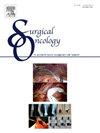评估微创手术对前肠癌患者长期生活质量的影响
IF 2.4
4区 医学
Q3 ONCOLOGY
引用次数: 0
摘要
与开放手术(OS)相比,微创手术(MIS)可以改善前肠癌的围手术期预后。然而,MIS对长期生活质量的影响尚不清楚。我们比较了前肠癌行MIS和OS患者的长期生活质量。方法通过在线支持小组对全球手术治疗的食管癌和胃癌患者进行调查。身体(P-QOL)和精神(M-QOL)幸福感使用短表格12问卷确定,并基于手术入路(MIS vs OS)进行比较。我们将“长期”定义为手术后超过3个月。结果100例食管癌和胃癌患者中,有64例在调查前3个月以上接受了手术治疗。患者年龄为56.6±9.9岁,女性46.0%,白人95.2%,中位生存期为33.0(14.0 ~ 63.0)个月。最常见的诊断为食管腺癌(69.8%)。手术方式包括食管切除术(56.5%)、食管胃切除术(29.0%)和胃切除术(14.5%),其中45.2%为OS, 48.4%为MIS。总体而言,该队列的P-QOL(40.7±10.4)和M-QOL(44.6±15.2)低于普通人群(50.0±10.0;p & lt;0.050)。OS组和MIS组在年龄、性别、种族、教育程度、收入、诊断和辅助治疗方面没有差异(p >;0.050)。前肠癌行OS和MIS患者的长期p - qol(38.5±11.6 OS比42.8±9.5 MIS, p = 0.123)和M-QOL(44.7±15.3 OS比44.9±14.9 MIS, p = 0.901)相似。结论前肠恶性肿瘤手术患者的mis与较高的长期生活质量无关。本文章由计算机程序翻译,如有差异,请以英文原文为准。
Evaluating the Impact of Minimally Invasive Surgery on Long-Term Quality of Life in Foregut Cancer Patients
Introduction
Compared to open surgery (OS), minimally invasive surgery (MIS) for foregut cancer improves perioperative outcomes. However, the impact of MIS on long-term quality of life (QOL) is unknown. We compare the long-term QOL of patients who underwent MIS and OS for foregut cancer.
Methods
Surgically managed esophageal and gastric cancer patients were surveyed globally via online support groups. Physical (P-QOL) and mental (M-QOL) well-being were determined using the Short Form-12 questionnaire and compared based on the surgical approach (MIS vs OS). We defined “long-term” as greater than 3 months from surgery.
Results
Out of 100 respondents with esophageal and gastric cancer, 64 survivors underwent surgical management greater than 3 months before the survey. They were 56.6 ± 9.9 years, 46.0% female, and 95.2% White, with a median survival of 33.0 (14.0–63.0) months. The most common diagnosis was esophageal adenocarcinoma (69.8%). Surgical procedures included esophagectomy (56.5%), esophagogastrectomy (29.0%), and gastrectomy (14.5%), of which 45.2% were OS and 48.4% were MIS. The cohort overall exhibited lower P-QOL (40.7 ± 10.4) and M-QOL (44.6 ± 15.2) compared to the general population (50.0 ± 10.0; p < 0.050). There was no difference in age, sex, race, education, income, diagnosis, and adjuvant therapy between OS and MIS cohorts (all p > 0.050). Long-term P-QOL (38.5 ± 11.6 OS vs. 42.8 ± 9.5 MIS, p = 0.123) and M-QOL (44.7 ± 15.3 OS vs. 44.9 ± 14.9 MIS, p = 0.901) was similar between patients who underwent OS and MIS for foregut cancer.
Conclusion
MIS is not associated with higher long-term QOL in patients who have undergone surgery for foregut malignancy.
求助全文
通过发布文献求助,成功后即可免费获取论文全文。
去求助
来源期刊

Surgical Oncology-Oxford
医学-外科
CiteScore
4.50
自引率
0.00%
发文量
169
审稿时长
38 days
期刊介绍:
Surgical Oncology is a peer reviewed journal publishing review articles that contribute to the advancement of knowledge in surgical oncology and related fields of interest. Articles represent a spectrum of current technology in oncology research as well as those concerning clinical trials, surgical technique, methods of investigation and patient evaluation. Surgical Oncology publishes comprehensive Reviews that examine individual topics in considerable detail, in addition to editorials and commentaries which focus on selected papers. The journal also publishes special issues which explore topics of interest to surgical oncologists in great detail - outlining recent advancements and providing readers with the most up to date information.
 求助内容:
求助内容: 应助结果提醒方式:
应助结果提醒方式:


